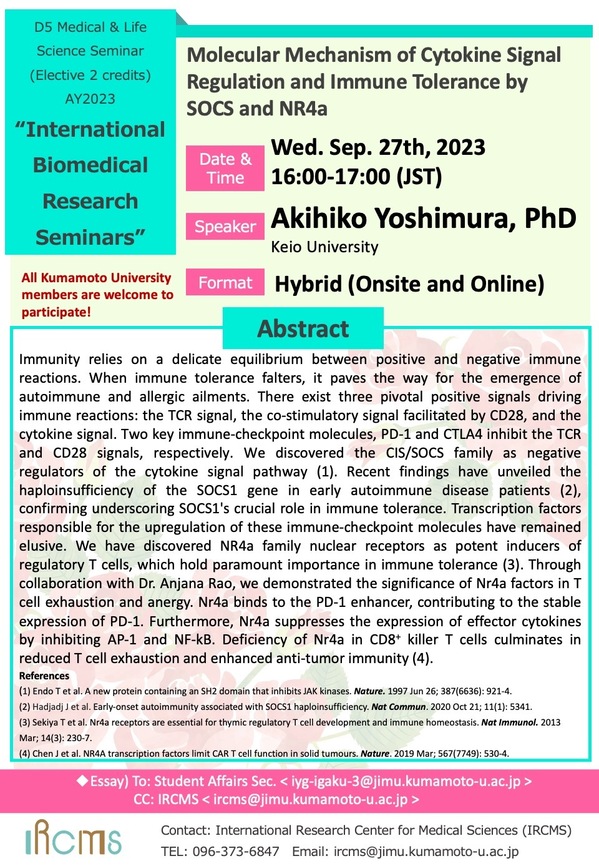- HOME
- News & Events
- [Sep. 27] D5 Seminar- Akihiko Yoshimura, PhD (Keio University)
News & Events
[Sep. 27] D5 Seminar- Akihiko Yoshimura, PhD (Keio University)
September 15 2023
The "D5 Medical & Life Science Seminar" course will be offered by International Research Center for Medical Sciences (IRCMS). It will run from May 2023 to March 2024, with lectures given by scientists who are affiliated with IRCMS or in collaboration with researchers at IRCMS. The lectures will be given once a month, in English, and by leading scientists in the relevant research field. Students will be taught: 1) how normal physiological functions are maintained in the human body; 2) how these systems become abnormal under certain pathophysiologic conditions; 3) why stem cells are important in animal development and homeostasis; 4) how stem cell-based approaches can help us understand disease mechanisms and find potential cure for diseases related to stem cell malfunction (e.g., cancer, aging).
Anyone who wants to join is welcome.
For students who have registered for the course, please check your attendance in Moodle.
Date : September 27th, 2023 (Wednesday)
Format : Hybrid (Onsite & Online)
Time : 16:00 - 17:00 (JST)
Speaker : Akihiko Yoshimura, PhD (Keio University)
Title : Molecular Mechanism of Cytokine Signal Regulation and Immune Tolerance by SOCS and NR4a
Abstract :
Immunity relies on a delicate equilibrium between positive and negative immune reactions. When immune tolerance falters, it paves the way for the emergence of autoimmune and allergic ailments. There exist three pivotal positive signals driving immune reactions: the TCR signal, the co-stimulatory signal facilitated by CD28, and the cytokine signal. Two key immune-checkpoint molecules, PD-1 and CTLA4 inhibit the TCR and CD28 signals, respectively. We discovered the CIS/SOCS family as negative regulators of the cytokine signal pathway (1). Recent findings have unveiled the haploinsufficiency of the SOCS1 gene in early autoimmune disease patients (2), confirming underscoring SOCS1's crucial role in immune tolerance. Transcription factors responsible for the upregulation of these immune-checkpoint molecules have remained elusive. We have discovered NR4a family nuclear receptors as potent inducers of regulatory T cells, which hold paramount importance in immune tolerance (3). Through collaboration with Dr. Anjana Rao, we demonstrated the significance of Nr4a factors in T cell exhaustion and anergy. Nr4a binds to the PD-1 enhancer, contributing to the stable expression of PD-1. Furthermore, Nr4a suppresses the expression of effector cytokines by inhibiting AP-1 and NF-kB. Deficiency of Nr4a in CD8+ killer T cells culminates in reduced T cell exhaustion and enhanced anti-tumor immunity (4).
References
(1) Endo T et al. A new protein containing an SH2 domain that inhibits JAK kinases. Nature. 1997 Jun 26; 387(6636): 921-4.
(2) Hadjadj J et al. Early-onset autoimmunity associated with SOCS1 haploinsufficiency. Nat Commun. 2020 Oct 21; 11(1): 5341.
(3) Sekiya T et al. Nr4a receptors are essential for thymic regulatory T cell development and immune homeostasis. Nat Immunol. 2013 Mar; 14(3): 230-7.
(4) Chen J et al. NR4A transcription factors limit CAR T cell function in solid tumours. Nature. 2019 Mar; 567(7749): 530-4.

